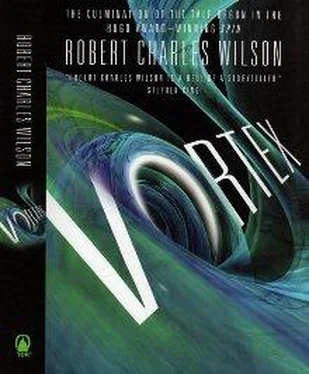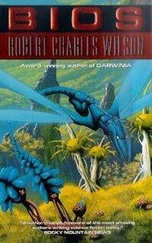The expression on his face was interesting—awe and fear, mixed together.
Vox Core was mostly underground, but the fraction of it that showed was impressive enough. The Farmers had camped in the lee of a low hill, and from this angle Vox Core looked like a jewelry box abandoned by a spendthrift god. Its half-mile-high defensive walls were the box; the jewels were the hundreds of faceted towers still standing: communications and energy-distribution points, light-gathering surfaces, aircraft bays, managerial residences. To Turk I suppose it looked improbably gaudy, but I knew (because Treya had known) that every material and every surface served a purpose—black or white facades to sink or radiate heat, blue-green panels doing photosynthetic work, ruby-red or smoky indigo windows to block or enhance particular frequencies of visible light. The setting sun gave it all a soft, seductive sheen.
The part of it that was intact, at least. There was enough of Treya in me to ache at the damage that had been done.
Most of what I recognized as the starboard quadrant of the city was gone. That was bad, because what lay beneath that part of the visible city was some of Vox Core’s essential infrastructure. Vox was complexly interconnected, and in the past it had sustained major damage without loss of function. But even the most decentralized network will fail if it loses too much connectivity, and that was what must have happened when the nuke penetrated our defenses. It was as if Vox’s brain had suffered a massive stroke, the damage spreading and compounding itself until the whole organism lost function. Tendrils of smoke still wafted up from the impact point. A hole had been punched in the starboard wall of the city, which might have provided an entry point for Farmer forces, except that radioactive and still-smoldering rubble had barred the gap.
Treya had spent the whole of her life in this city, and her shock welled up in me and made my eyes water.
Turk—once he made sure Digger Choi was out of earshot—said, “Tell me about the people who did this.”
“Built the city or dropped the bomb?”
“Dropped the bomb.”
“An alliance of cortical democracies and radical bionormatives. They were determined not to let us cross the Arch. Scared we’ll call down some kind of doom by attracting the attention of the Hypotheticals.”
“You think that might happen?”
It was a question Treya would never have entertained. Treya had been a good Voxish citizen, blithely convinced that the Hypotheticals were benevolent and that human beings could aspire to some kind of intercourse with them. But as Allison I could be agnostic about it. “I don’t actually know.”
“Sooner or later we might have to pick sides in one of these fights.”
That would be a luxury, I thought, to pick a side.
But for now the question was moot. We ate the pea-green gunk we had been given and stood up for a last look around before Digger Choi came to tie us up for the night. The sky had gotten darker and the peak of the Arch shimmered almost directly overhead. Vox Core itself had filled with shadows.
That was the saddest thing of all, it seemed to me: the darkness of Vox Core. All my life ( Treya’s life) the Core had been ablaze with light. It leaked light like a glorious sieve. Its light was its heartbeat. And now it was gone. Not even a twinkle.
The Farmer attack, if it was going to happen at all, would have to happen soon. Until then there was nothing to do but look at the sky, and it was obvious from the dire angle of the Arch that we were at the critical point of the passage. The Vox Archipelago was big enough that some of it must already be past the midway point. But that didn’t matter—Vox would transit all at once or not at all. An Arch—and this truth had been established many centuries ago—was more like an intelligent filter than a door. Back when this Arch was working it had been able to distinguish between a bird in flight and a boat in the water: send the boat from Earth to Equatoria but leave the bird behind. That’s not a simple decision. The Arch had to be able to identify human beings and their works while ignoring the countless other living creatures who inhabited (or had once inhabited) both worlds. Crossing an Arch, in other words, wasn’t a mechanistic process. The Arch looked at you, evaluated you, accepted you or rejected you.
The most likely outcome was that we wouldn’t be admitted to Old Earth at all. But I was more afraid of the other possibility. Even before the Arch stopped working, the Earth had changed beyond anything Turk would have recognized. The last refugees from the polar cities had described drastic shifts in the oceanic chemocline, H 2S boiling out of hopelessly eutrophied offshore dead zones, massive and sudden dry-land extinctions.
I closed my eyes and drifted into the dazed semiconsciousness that passes for sleep when you’re exhausted and hungry and in pain. Periodically I opened my eyes and looked at Turk where he lay in the shadows with his arms bound behind him. He was nothing like what Treya had once pictured as an emissary from the Hypotheticals. He looked exactly like what he was—a rootless drifter, no longer young and worn almost beyond endurance.
I guessed he was dreaming, because he moaned from time to time.
Maybe I dreamed, too.
What woke me next—still deep in that long night—was a sound so loud it cut the darkness like a knife. It was a deep-throated hooting, continuous and inhuman but familiar, familiar… dazed, I couldn’t place it at first; but when I recognized it I felt what I had not felt for many days: hope.
I kicked at Turk to rouse him. He opened his eyes and rolled upright, blinking.
“Listen!” I said. “You know what that is? It’s the alarm, Turk, it’s the call-in, the come-to-shelter, ” struggling to translate Voxish words into ancient English, “it’s the fucking air-raid siren !”
The wailing was broadcast from the highest towers of Vox Core. It was a signal to get inside the walls, that some kind of attack was imminent, and surely that was true. But here was the important thing: if Vox Core was able to sound the siren, at least some of its power must have been restored.
Vox Core was alive!
“Means what?” asked Turk, still fighting sleep.
“It means we have a chance of getting out of this!” I managed to wiggle upright so I could have a look. Vox Core was still mainly dark… but even as I registered that fact a searchlight rayed from the nearest watchtower and swept over the treeless meadows, lighting up the Farmers as they doused their fires and hurried to suit up for war. Then there were more lights: tower by tower, block by block, Vox Core began to reclaim itself from the darkness. Smaller lights like fireflies scattered from the high aerodromes, and those were aircraft, armed and lethal.
It made me giddy. I heard myself shouting into the noise: Here we are! Come and get us! Something stupid like that. Treya’s old loyalties bursting out of my throat.
Then the weapons rained down, and the Farmers began to die.
Chapter Five
Sandra and Bose
Sandra booked off two hours for lunch, making creative use of a free hour she had originally scheduled for her next consultation with Orrin Mather. The restaurant where she had arranged to meet Bose was crowded with employees from the carpet wholesaler across the highway, but the table she snagged was out of the way and screened from the worst of the noise by a hedge of plastic ficus. Quiet enough for conversation. Bose nodded approvingly when he arrived.
He wasn’t in uniform. He looked better out of police drag, Sandra thought. Jeans and a white shirt that set off his complexion. She asked him whether he was on duty today.
Читать дальше












